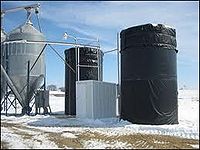Difference between revisions of "Silo Heaters"
Jump to navigation
Jump to search
(Created page with "Category:Heating{{Knoppen}} <noinclude><!------------------------------------------------ * READ THIS FIRST * Only edit this page if you can improve the content. * Improper ...") |
PurplePen19 (talk | contribs) |
||
| Line 7: | Line 7: | ||
* Please start editing this page after the /noinclude | * Please start editing this page after the /noinclude | ||
* -------------------------------------------------></noinclude> | * -------------------------------------------------></noinclude> | ||
[[File:Silo heaters.jpg|thumb|200px|right|Silo heaters]] | |||
'''Silo heaters''' offer year round freeze protection for frac tanks, dairy products, petroleum, and many other temperature sensitive materials. If concrete is to be used at temperatures of up to minus 15° C, the sand and gravel silos require heating and the water used for mixing the concrete must also be pre-heated. The Silo heaters run with hot air so that the water/cement ratio is not affected. In continuous operation the plant heats the minerals by 15° C or more. With pre-heated mixing water from the boiler, the concrete temperature can be increased by an additional 8° C. Hot air is blow directly onto the minerals and moves up through the silo, preventing localized heating and condensation. | |||
Latest revision as of 19:03, 28 August 2012
Silo heaters offer year round freeze protection for frac tanks, dairy products, petroleum, and many other temperature sensitive materials. If concrete is to be used at temperatures of up to minus 15° C, the sand and gravel silos require heating and the water used for mixing the concrete must also be pre-heated. The Silo heaters run with hot air so that the water/cement ratio is not affected. In continuous operation the plant heats the minerals by 15° C or more. With pre-heated mixing water from the boiler, the concrete temperature can be increased by an additional 8° C. Hot air is blow directly onto the minerals and moves up through the silo, preventing localized heating and condensation.
